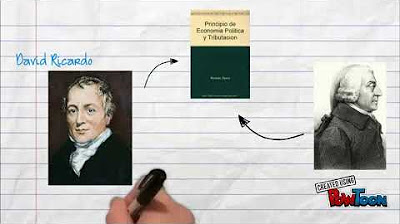The Wealth Of Nations: A 3 Minute Summary
Summary
TLDRThe Wealth of Nations, written by Adam Smith in 1776, is a cornerstone of modern economic thought, focusing on free market capitalism and the division of labor. Smith argued that when individuals pursue self-interest guided by supply and demand, the economy benefits. He emphasized the role of specialization in increasing productivity and driving economic growth. Smith critiqued mercantilism and advocated for limited government intervention, with a focus on maintaining a legal system and providing public goods. His ideas on free trade, market self-regulation, and economic prosperity continue to shape contemporary economic policies.
Takeaways
- 😀 The Wealth of Nations, written by Adam Smith in 1776, is a foundational work in economics.
- 😀 It introduces the concept of free market capitalism and emphasizes the division of labor.
- 😀 Smith argued that when individuals act in their own self-interest, guided by the 'Invisible Hand,' the economy benefits as a whole.
- 😀 Economic prosperity is driven by the production of goods and services, not the accumulation of gold or silver.
- 😀 The division of labor and specialization increase worker efficiency, leading to higher productivity and economic growth.
- 😀 Smith advocated for limited government intervention, allowing markets to self-regulate and reach equilibrium.
- 😀 He acknowledged that some government functions, like legal systems and public goods, are necessary for economic functioning.
- 😀 The book critiques mercantilism, particularly its protectionist policies, and proposes free trade as a better economic system.
- 😀 Smith’s ideas on value theory, labor theory of value, and the roles of capital, wages, and rent are explored in the book.
- 😀 The Wealth of Nations remains relevant today and has had a lasting impact on modern economic thought and policies.
Q & A
What is the central theme of 'The Wealth of Nations'?
-The central theme of 'The Wealth of Nations' revolves around the concept of free-market capitalism and the division of labor, arguing that individuals pursuing their own self-interest in the market, guided by the invisible hand of supply and demand, will lead to overall economic prosperity.
How does Adam Smith view economic prosperity in 'The Wealth of Nations'?
-Adam Smith argues that economic prosperity is not generated by a country's accumulation of gold or silver, but rather through the production of goods and services that cater to the needs and wants of society.
What role does the division of labor play in Smith's economic theory?
-Smith emphasizes the importance of specialization and the division of labor, suggesting that when workers focus on specific tasks, they become more skilled and efficient, leading to increased productivity, industry growth, and economic expansion.
What is the 'Invisible Hand' according to Adam Smith?
-The 'Invisible Hand' refers to the concept that when individuals pursue their own self-interest in the market, guided by supply and demand, the overall economy benefits and reaches an optimal equilibrium without the need for central control.
What is Smith's stance on government intervention in the economy?
-Adam Smith advocates for limited government intervention, believing that markets left to their own devices will self-regulate. However, he acknowledges that certain interventions, such as maintaining a legal system and providing public goods, are necessary for the smooth functioning of the economy.
How did Smith critique mercantilism?
-Smith critiqued mercantilism for its protectionist trade policies, hoarding of precious metals, and government control over economic activities. He proposed a system based on free trade and open markets to promote greater wealth and prosperity for nations.
What is the significance of free trade in Smith's economic theory?
-Smith believed that free trade and open markets would foster competition, increase wealth, and improve the prosperity of nations by allowing countries to focus on their comparative advantages rather than restrictive policies like mercantilism.
What other economic concepts are explored in 'The Wealth of Nations'?
-In addition to the division of labor and free-market capitalism, Smith explores concepts such as value theory, labor theory of value, and the roles of capital, wages, and rent in the economy.
How does Adam Smith's theory relate to modern economic thought?
-Adam Smith's ideas, particularly regarding free-market capitalism, the division of labor, and limited government intervention, have significantly influenced modern economic thought and continue to shape discussions about economic systems and policies today.
Why is 'The Wealth of Nations' considered a foundational work in economics?
-The Wealth of Nations is considered a foundational work in economics because it introduced groundbreaking concepts such as free-market capitalism, the division of labor, and the role of government in the economy, which have become central to economic theory and practice.
Outlines

このセクションは有料ユーザー限定です。 アクセスするには、アップグレードをお願いします。
今すぐアップグレードMindmap

このセクションは有料ユーザー限定です。 アクセスするには、アップグレードをお願いします。
今すぐアップグレードKeywords

このセクションは有料ユーザー限定です。 アクセスするには、アップグレードをお願いします。
今すぐアップグレードHighlights

このセクションは有料ユーザー限定です。 アクセスするには、アップグレードをお願いします。
今すぐアップグレードTranscripts

このセクションは有料ユーザー限定です。 アクセスするには、アップグレードをお願いします。
今すぐアップグレード5.0 / 5 (0 votes)






